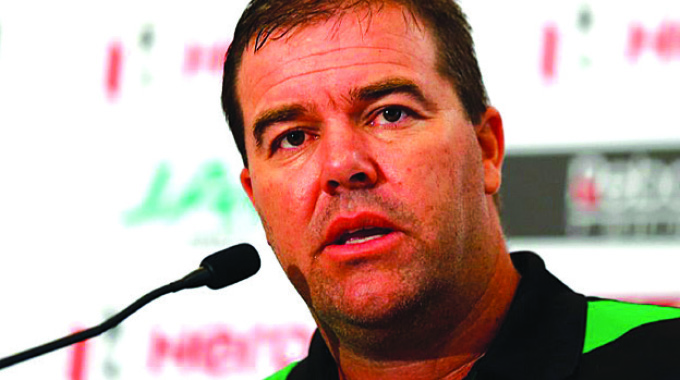Belly of the Betting Beast

Robson Sharuko
Senior Sports Editor
WHEN Heath Streak started a WhatsApp conversation with an Indian bookmaker, he probably didn’t know he was batting himself into the heart of a shadowy criminal organisation.
A complex underworld enterprise with its footprints in India, Sri Lanka, Bangladesh, Pakistan and the United Arab Emirates which, among other things, owned a franchise in Abu Dhabi’s T20 League, just three years ago.
The leader of that organisation, dubbed Mr X by the International Cricket Council, has been unmasked to be blacklisted Indian bookmaker, Deepak Agarwal, who is serving a two-year ban, from the game.
Agarwal even tried to organise his own T20 league, in India, where he intended to woo some of the world’s best cricketers.
However, this would have been just a phony event, where the grand mission was to make millions, from betting in fixed matches.
The Board of Control for Cricket in India rejected the proposal, probably saving the game from a scandal which would have shaken it to the core, and ripped its soul apart.
But, there have been some deadly consequences, in this network of evil, including the death of a teenage Indian cricketer, whose suicide note appeared to point to the pressure, which had been exerted on him, by Agarwal.
The young Indian cricketer took his life, in 2011, in Udaipur.
The bookmaker, who was known then as Shoti, was arrested, based on the suicide note but the case, it appears, disappeared along the justice system.
However, when former Bangladesh captain, Shakib Al Hasan, was nailed by the ICC anti-corruption unit, and handed a two-year ban from the sport, in October 2019, the skeletons came tumbling from the cupboard.
Shakib, one of the world’s finest cricketers, accepted charges of contravening the ICC anti-corruption code, for failing to report an approach from Agarwal, and also engaging in conversations, with such a shadowy character, without alerting the ICC.
The all-rounder had a series of engagements with Agarwal, during the Bangladesh, Sri Lanka and Zimbabwe Tri-Series in January 2018, in Dhaka, and the 2018 Indian Premier League, where he played for the Sunrisers Hyderabad.
“I am, obviously, extremely sad to have been banned from the game I love, but I completely accept my sanction for not reporting the approaches,’’ Shakib said, after he was sanctioned.
“The ICC ACU (Anti-Corruption Unit) is reliant on players to play a central part, in the fight against corruption, and I didn’t do my duty in this instance.
“Like the majority of players, and fans around the world, I want cricket to be a corruption-free sport and I am looking forward to working with the ICC ACU team to support their education programme and ensure young players don’t make the same mistake I did.”
Shakib has since completed his two-year ban, and has returned to international cricket, with Bangladesh, and to the IPL, with the Kolkata Knight Riders.
His first engagement, with Deepak, was when he was playing in the Bangladesh Premier League, and his contacts were supplied to the shadowy Indian bookmaker, by Streak.
The former Zimbabwe captain, and coach, had established close contacts, with many Bangladesh players, during his time as the bowling coach of the Asian national cricket team.
He also worked in the country’s Premier League.
Streak is now serving an eight-year ban, from the game, for a number of breaches, to the ICC anti-corruption code, in his dealings with Agarwal.
According to the ICC, Agarwal’s first engagement with Streak was from September 2017, and it went on for 15 months.
This puts his judgment into question given, by then, the shadowy activities of the Indian bookmaker, were already known, in the game.
“For someone with his notoriety, it was surprisingly easy to reach out to Deepak Agarwal, the alleged bookie who just brought down one of the most-celebrated titans of world cricket, Shakib Al Hasan,’’ cricket journalist, Nazmal Ahasan, who interviewed the bookmaker, wrote in December 2019.
“Here was a man who, according to a recent Times of India story, was ‘known in the spot-fixing circuit,’ and had been arrested in April 2017 for gambling offences.
“Yet, his digital footprint was everywhere on the Internet — from listed phone numbers to open domain registration records.
“And, then, there was his photo displayed on the website of the cricket academy he owns. It was as if he was waiting to be contacted.
“For someone, supposedly with a long experience in the dark alleys of cricket crookery, he was curiously too quick to own up to almost all the charges against him — that too, in the very first encounter.’’
Agarwal qualified to be sanctioned by the ICC because of his previous co-ownership, in 2018, of the Sindhis franchise, which took part in the T10 League, in Abu Dhabi.
The franchise’s marquee signing was Aussie all-rounder, Shane Watson, and such is the league’s extravagance it even hires Bollywood superstars, as their brand ambassadors.
However, the Sindhis franchise disappeared from the horizon, with officials saying it was on the advice of the ICC anti-corruption unit.
The franchise was revamped, to assume a new name, Deccan Gladiators, who finished as the runners-up, in the tournament, last year.
This year, the tournament attracted some of the world’s finest cricketers, including Chris Gayle, Chris Jordan, Shoaib Malik, Shahid Afridi, Dwayne Bravo, Dawid Malan, Kieron Pollard and Imran Tahir.
Former Zimbabwe skipper, Andy Flower, and the current Chevrons coach, Lalchand Rajpuit, were some of the coaches who took charge of the franchises, at the tournament.
There is nothing to suggest the tournament was held under a cloud of corruption.
But, in the wake of revelations by the ICC that Streak was paid two Bitcoins, equivalent to US$35 000 by Agarwal, the mode of payment makes things a little interesting.
After all, the current owner of Deccan Gladiators, the very franchise that rose from the ashes of the shamed Sindhis, is Gaurav Grover.
He describes himself as an “IT tycoon,” whose businesses involve, among other things, cryptocurrency operations.
Agarwal told journalist Ahsan that he and Grover are family friends, and business partners, and “worked together in cryptocurrency” as well as other businesses.
“Agarwal’s familiarity with cryptocurrency is, of course, noteworthy because, according to the ACU, he had offered to pay bribes to Shakib Al Hasan in Bitcoin, the principal cryptocurrency currently in circulation,’’ wrote Ahasan.
“The very nature of the cryptocurrency means transactions are untraceable and non-interceptable — that is why crypto is now the popular platform for illegal money movements, including bribery, money laundering, tax evasion, and sports betting.’’
Grover, however, told the Hindustan Times newspaper of India Agarwal did not have any role in the Deccan Gladiators.
But questions remain, especially after the ICC banned former UAE captain, Mohammad Naveed, and his teammate, Shaman Anwar Butt, for eight years, last month, for their involvement in corrupt activities.
Ironically, both cricketers were contacted by Agarwal, through his vast network, and they are part of six international cricketers, from the Emirates, who have been banned, in the past year.











Comments